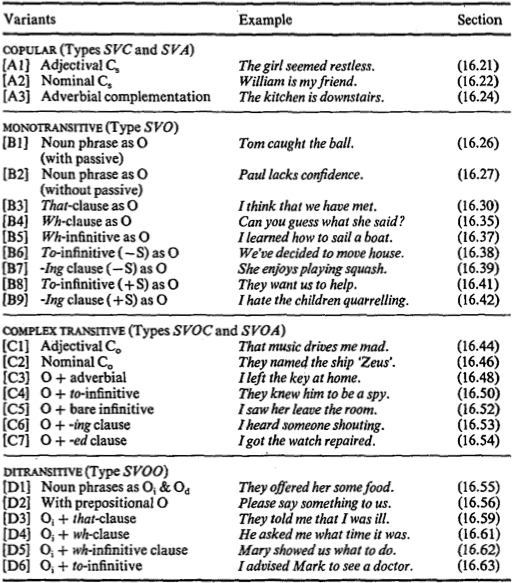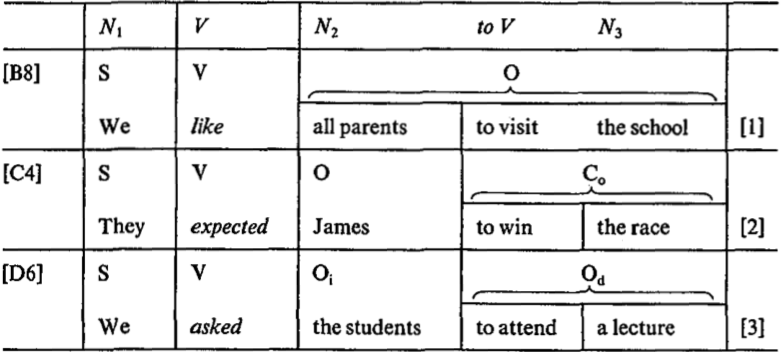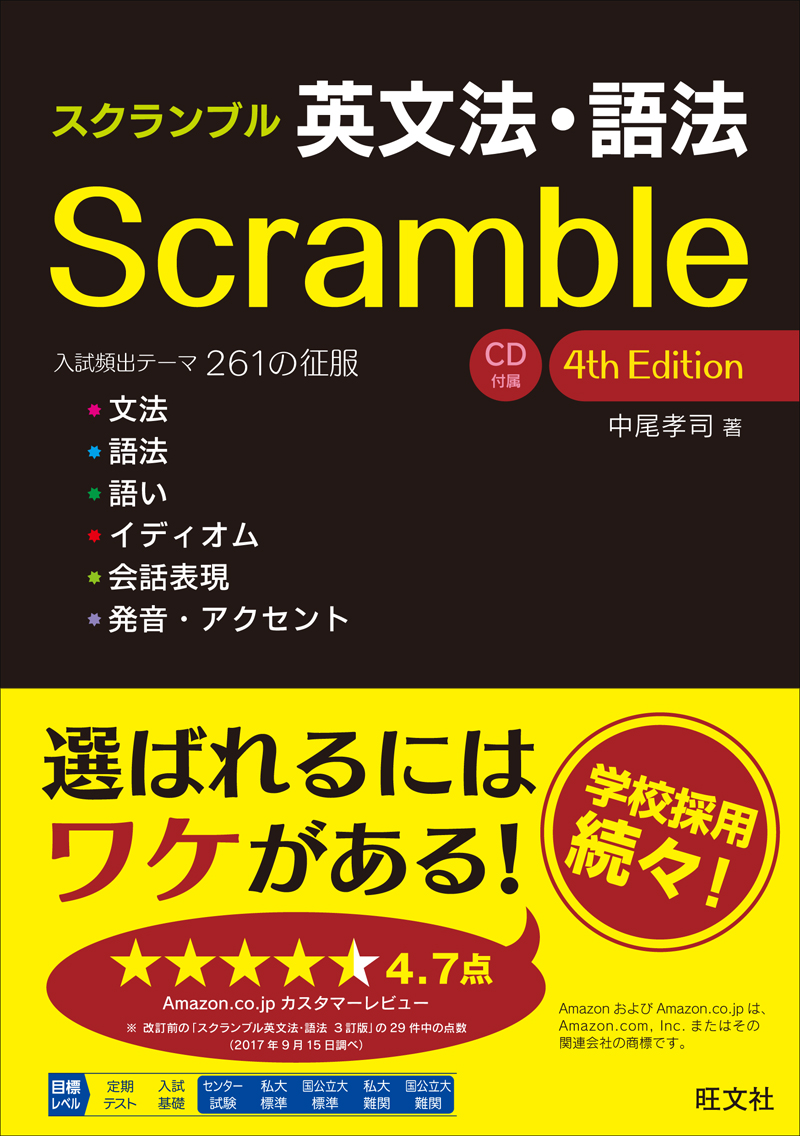



先日行われた大学入学共通テストの英語を、私の方でさっと確認した範囲で簡潔に解説します(問題と解答はココなどにあります)。
今年の高3受験生も同日模試で受けた高2生・高1生も、本番の試験あるいはそれに近い形で実施した試験というのは特に記憶に残るものですから、これを利用しない手はありません。点数に一喜一憂するだけでやりっぱなしにせず、今後につなげるべくしっかり出題語彙・語法・文法を確認して頭に叩き込んでおきましょう(国立二次および私大一般入試で同じものに遭遇しないとも限りません)。
問題中に出てきた、自分が覚えていない、あるいは定着の怪しい単語・熟語・語法・文法は、すべて手持ちの単語集、熟語集、文法・語法問題集で確認してチェックを入れていきます。『英単語ターゲット1900(「タゲ単5版」および「タゲ単6版」)』『英熟語ターゲット1000(「タゲ熟」)』『システム英単語(「シス単4版」および「シス単5版」)』『DUO3』『速読英単語』に収録されている語彙に関しては、すぐに掲載箇所が引けるようにその番号も記載しています⋯つづく

(前回からの続き...2年以上前なので何の続きかすっかり忘れてしまいましたが)
SVOCのCは、厳密には「predicative complement(叙述補語)」と言います。素の「complement(補部)」は、叙述補語以外にも各種節や句を構成するのに必須の要素(例えば「前置詞の目的語(「with him」のhim)」なども一種のcomplementです)をも包含するため、その他complementと区別するためにそう呼ばれます(日本語の場合「補語」と「補部」で使い分けられるようですが)。
叙述補語(C)は、文の主語(S)や目的語(O)に付与された属性を表す、つまりそれがどんなものであるかを「叙述」するものです。
主格(叙述)補語(subjective predicative complement)の場合、主語になっている名詞の属性を表します(例:「ⓈMary is Ⓒpretty.」)。目的格(叙述)補語(objective predicative complement)の場合、目的語になっている名詞の属性を表す形になります(例:「Tom made ⓄMary Ⓒhappy.」)。
基本、叙述補語は形容詞句または名詞句(例:「ⓈMary is Ⓒa doctor.」)になります。形容詞句や名詞句ではないけれども、Vの構成要素として必須になる副詞句(例:「I have been in the garden all the time since lunch.」「You must put all the toys upstairs immediately.」)は、「副詞的補語(adverbial complement、A)」または「前置詞句補語(pp complement)」として別分類にされることもあります。
叙述補語がなぜ「叙述補語(predicative complement)」と呼ばれるかと言うと、意味的(semantically)に「述語(predicate)」と同等だからです。例えば「HeⓋis Ⓒa good speaker.」と「He Ⓥspeaks well.」は、動詞以降の意味がほぼ同じです。
ということで、SVOCの文のOとCに当たる語は主述の関係にあり、それぞれ取り出して文を作ることもできます(例:「Tom made ⓄMary Ⓒhappy.」→「Mary was happy.」)⋯が、ややこしいことに、実はVの後に来る2語間において主述の関係が成立しうるものが全て「SVOC」の文型になるわけではないようです。
Quirkの『Comprehensive Grammar of the English Language』(1985年)では以下のように分類しています(2002年の『Cambridge Grammar of the English Language』の解説はその後に見ていきます):

知覚動詞や使役動詞がSVOCの文型を取るという記述は日本の英語参考書でもよく見かけます。いずれも原形不定詞をCに取ることができますが、であれば目的語の後にto不定詞を取る他の動詞wantやadviseも同文型でいいような気がします...が、残念ながらそのような類推は成立しないようです。上述の通り、不定詞を含む文形はSVO、SVOC、SVOOの3パターンあります。あらためてto不定詞を用いるもののみ取り上げると:

という構造になります。
SVOの場合、不定詞句の前にある名詞句は、不定詞句の動詞の意味上の主語になっています。例えば「I want you to study English.」であれば、studyをするのはyouです。そして「you to study English(あなたが英語を勉強すること)」全体がOになります。youの無い「I want to study English.」であれば「to study English」はOですから、まぁわからなくはありません。動名詞で書けば、所有格で意味上の主語を表して「your studying English」になりますし(無論、この文においては直接動名詞に書き換えはできませんが)。 youが単独ではOにならないのは、この文を受動態にすることができないことからも分かります:
このことからも、SVOの文型であることがわかります。
SVOC(C=to不定詞)の形は、以下の動詞が取ることができます:
SVOO(O=to不定詞)の形は、以下の動詞が取ることができます:
(続く)
SVOCのCは、厳密には「predicative complement(叙述補語)」と言います。素の「complement(補部)」は、叙述補語以外にも各種節や句を構成するのに必須の要素(例えば「前置詞の目的語(「with him」のhim)」なども一種のcomplementです)をも包含するため、その他complementと区別するためにそう呼ばれます(日本語の場合「補語」と「補部」で使い分けられるようですが)。
叙述補語(C)は、文の主語(S)や目的語(O)に付与された属性を表す、つまりそれがどんなものであるかを「叙述」するものです。
[A] predicative complement characteristically denotes a property that is ascribed to the referent of the subject or object.
(CaGEL, p. 53)
主格(叙述)補語(subjective predicative complement)の場合、主語になっている名詞の属性を表します(例:「ⓈMary is Ⓒpretty.」)。目的格(叙述)補語(objective predicative complement)の場合、目的語になっている名詞の属性を表す形になります(例:「Tom made ⓄMary Ⓒhappy.」)。
基本、叙述補語は形容詞句または名詞句(例:「ⓈMary is Ⓒa doctor.」)になります。形容詞句や名詞句ではないけれども、Vの構成要素として必須になる副詞句(例:「I have been in the garden all the time since lunch.」「You must put all the toys upstairs immediately.」)は、「副詞的補語(adverbial complement、A)」または「前置詞句補語(pp complement)」として別分類にされることもあります。
叙述補語がなぜ「叙述補語(predicative complement)」と呼ばれるかと言うと、意味的(semantically)に「述語(predicate)」と同等だからです。例えば「HeⓋis Ⓒa good speaker.」と「He Ⓥspeaks well.」は、動詞以降の意味がほぼ同じです。
[A]lthough a good speaker is syntactically an NP (名詞句) complement, it is semantically comparable to a predicate like spoke well. This is the basis for the term 'predicative complement': the complement typically represents what is predicated of the subject-referent in a way that is similar to that in which a whole predicate does.
(A Student's Introduction to English Grammar, pp. 73-74)
ということで、SVOCの文のOとCに当たる語は主述の関係にあり、それぞれ取り出して文を作ることもできます(例:「Tom made ⓄMary Ⓒhappy.」→「Mary was happy.」)⋯が、ややこしいことに、実はVの後に来る2語間において主述の関係が成立しうるものが全て「SVOC」の文型になるわけではないようです。
QuirkのCGELの場合
Quirkの『Comprehensive Grammar of the English Language』(1985年)では以下のように分類しています(2002年の『Cambridge Grammar of the English Language』の解説はその後に見ていきます):

- SVO(O=to不定詞)
They want us to help.(彼らは私たちに助けて欲しい。) - SVO(O=現在分詞)
I hate the children quarrelling.(私は子供たちが口論しているのが嫌いだ。) - SVOC(C=to不定詞)
They knew him to be a spy.(彼らは彼がスパイだと知っていた。)
My contract allows me to take one month's leave.(私の雇用契約は私が1ヶ月の休暇を取ることを許している。) - SVOC(C=原形不定詞)
I saw her leave the room.(私が彼女がその部屋を去るのを見た。) - SVOC(C=現在分詞)
I heard someone shouting.(私は誰かが叫んでいるのを聞いた。) - SVOC(C=過去分詞)
I got the watch repaired.(私はその腕時計を直してもらった) - SVOO(O=to不定詞)
I advised Mark to see a doctor.(私はマークに医者に行くことを勧めた)
(CGEL, p. 1171)
知覚動詞や使役動詞がSVOCの文型を取るという記述は日本の英語参考書でもよく見かけます。いずれも原形不定詞をCに取ることができますが、であれば目的語の後にto不定詞を取る他の動詞wantやadviseも同文型でいいような気がします...が、残念ながらそのような類推は成立しないようです。上述の通り、不定詞を含む文形はSVO、SVOC、SVOOの3パターンあります。あらためてto不定詞を用いるもののみ取り上げると:

- SVO(O=to不定詞):ⓈWe Ⓥlike Ⓞall parents to visit the school.
- SVOC(C=to不定詞):ⓈThey Ⓥexpected ⓄJames Ⓒto win the race.
- SVOO(O=to不定詞):ⓈWe Ⓥasked Ⓞthe students Ⓞto attend a lecture.
(CGEL, p. 1216)
という構造になります。
SVO(O=to不定詞)
SVOの場合、不定詞句の前にある名詞句は、不定詞句の動詞の意味上の主語になっています。例えば「I want you to study English.」であれば、studyをするのはyouです。そして「you to study English(あなたが英語を勉強すること)」全体がOになります。youの無い「I want to study English.」であれば「to study English」はOですから、まぁわからなくはありません。動名詞で書けば、所有格で意味上の主語を表して「your studying English」になりますし(無論、この文においては直接動名詞に書き換えはできませんが)。 youが単独ではOにならないのは、この文を受動態にすることができないことからも分かります:
- × You are not wanted to study English by me.
- Jack prefers his wife to drive the truck.
- Jack prefers for his wife to drive the truck.
(CGEL, p. 1193)
このことからも、SVOの文型であることがわかります。
SVOC(C=to不定詞)
SVOC(C=to不定詞)の形は、以下の動詞が取ることができます:
- announce, declare, proclaim, pronounce, report, repute, rumour, say, tip
- assume, believe, conceive,consider, expect, feel, find, imagine, know, presume, reckon, see, suppose, take, think, understand
- intend, mean
- appoint, elect, name, vote
- cause, drive, force, get, lead, prompt
- allow, authorize, compel, constrain, enable, entitle, equip, fit, oblige, permit, require
- assist, bother, bribe, condemn, dare, defy, encourage, help, induce, inspire, press, summon
- John believed Ⓞthe stranger to be a policeman.
- John believed that Ⓢthe stranger was a policeman.
- The stranger was believed to be a policeman.
- ○ The field marshal was said to be planning a new strategy.
- × Someone said the field marshal to be planning a new strategy.
SVOO(O=to不定詞)
SVOO(O=to不定詞)の形は、以下の動詞が取ることができます:
- advise, command, entreat, instruct, remind, teach, ask, counsel, exhort, invite, request, tell, beg, detail, forbid, order, recommend, urge, beseech, direct, implore, persuade, challenge, enjoin, incite, pray
- I told/advised/persuaded Mark to see a doctor.(マークに、医者にかかるるよう、言った/勧めた/説得した。)
- Mark was told/advised/persuaded to see a doctor.
(続く)

「オックスフォード英語辞典が、過去12カ月のムードをもっともよく総括している2020年の言葉を発表する季節だ。が、2020年は一つの言葉に絞ることができず、代わりに「未曾有の一年を複数の言葉で網羅する」と発表した。その中には新型コロナウイルスパンデミック関連の言葉や、オーストラリアの森林火災やBlack Lives Matterムーブメントなど2020年の世界に影響を与えた問題に触れた言葉が入っている⋯Bushfire(森林火災)、Covid-19、WFH(working from home・在宅勤務)、Lockdown(ロックダウン)、circuit-breaker(サーキットブレーカー・ロックダウンの前の行動制限措置)、 support bubbles(サポートバブル・支援の安全圏)、 Keyworkers(キーワーカー)、 Furlough(一時解雇)、 Black Lives Matter(ブラック・ライブズ・マター)、 moonshot(困難だが実現すれば大きなインパクトを与える壮大な計画や挑戦)など(詳細:BAZAAR(via Yahoo))。


大学受験準備期に入っている生徒の指導では、英文法・語法問題集の小テストを毎回実施しています。「
英文法・語法問題集
」というのは、左側ページに実際の大学入試から引いてきた穴埋めか並べ替えの短問が4〜5問列記されていて、右側ページにはその解答とちょっとした解説が載っている問題集のことで、多くの高校でも副教材として採用されています。

今は『 Vintage 』を使っているところが多いでしょうか。『 Scramble 』を使っている高校も幾つかあり、まだ『Next Stage』を使っているところも見受けられます。『Upgrade』は最近見なくなりました。日本の受験英語に特化された、その「極み」みたいな教材なので、大学附属校に通う生徒の指導においては基本実施していませんが、大学受験準備には確かに学習効率の良い教材です。



生徒が実施する分には、どれでも一冊決めたらそれを完璧に仕上げれば十分だと思います。単語集もそうですが、学校と茗溪とで違うものを2つ並行使用しても非効率的なので、高2以降から茗溪に入会した生徒の場合は高校で既に使用中のものを利用しています。中3〜高1までの生徒には事前にこちらから一冊渡します。この場合、高2・高3になった時に学校で使用するであろう同じものを渡せれば一番良いのですが、学年や英語科担当教師によって何を使用するかはコロコロ変わるので、今はとりあえず『Vintage』を渡すようにしています。
講師(つまり私)の方でも、長文読解演習や過去問演習の指導の際に、生徒が読み取れなかった文法・構文・語法に遭遇したら、その都度、生徒に手持ちの英文法・語法問題集の当該箇所を開かせてチェックを入れさせるという形で利用しています。『 Evergreen 』や『be』などの 総合英語 参考書も生徒達は大抵高校で渡されているので持っていますが、実際に何周も回してやり込むのは英文法・語法問題集の方ですし、またちょっとした復習用の問題も容易に利用できるので、こちらを使っています。(文法事項の導入時や、あるいは包括的に復習したい場合には、『Evergreen』などの総合英語の 準拠問題集 や、あるいは「 高校リード問題集 」などのちゃんとした文法問題集を実施したほうが良いです。)
生徒が実施する分には上述の通り正直どれでもいいのですが(いずれも完璧とは言いがたく一長一短で、また量的な知識詰め込み型教材なのでそんなに細かく拘ってもしょうがない)、講師の方で指導において生徒用 アンチョコ 的に利用する際に「面倒だなぁ」と思うことが度々あったりします。端的に「こんな定番表現が何でもっと分かりやすい箇所にちゃんとまとめて載っていないの?」というのに遭遇するのです。生徒の手持ちの英文法・語法問題集に載っていない、あるいは解説が不十分なものに出くわしたら、その余白に解説を書き足させたり、あるいは私の方で用意した小さなプリントをテープで貼り付ける形にしています。それはそれでいいのですが、その際、「あれ、これどこに載ってるんだったっけ、助動詞の章だったか接続詞の章だったか⋯牽引でどう調べれば見つかるんだったか⋯あるいはそもそも載っていなかったっけ⋯」と戸惑うことがしばしばあります。そうした同じ過ちを何度も繰り返すのも実に間抜けなので、忘れないよう少しづつ記録を取っていこうかと思います(改訂してくれたら一番良いのですが⋯)。
その一つが仮定法現在です。「I recommended that he write and apologize.」のような文のthat節や、「Tom whispered lest Mary hear him.」などの慣用表現、「God save the Queen.」などの祈願文において動詞が原形不定詞になるやつです。これがどの英文法・語法問題集にも満足に載っていません。どれも章1つ丸々「仮定法」に割いているのにもかかわらず、です。まず『Vintage』の場合、「和文さくいん」で文法用語を索引できるようになっているのですが、ここには「仮定法現在」の見出しは入っていません。「仮定法」の章には仮定法過去と仮定法過去完了のみ記載されています。とは言え、仮定法現在に相当する表現が冊子のどこにも全く載っていない、と言うわけでもありません。
では、どうすればいいかと言うと、まずは「英文さくいん」を「suggest that S (should) do」などの形で調べます。すると、Vintageであれば第17章「動詞の語法」にて掲載されていて、「後ろにthat節を続け、that節内では動詞の原形やshouldを用いる動詞」としてまとめられているのが見つかります。「lest S (should) V」は「for fear that S should V」の関連表現として接続詞の章に記載があります。祈願文も「和文さくいん」にはありません。助動詞mayを用いたものが助動詞の章に「祈願を表すmay」として記載されています⋯ただこちらは原形不定詞(仮定法現在)を用いたものはありません。「Suffice it to say that S V」などに関しては一切記載がありません。
『Scramble』も「動詞の語法」の章に「that節で原形またはshould+原形を用いる動詞」が記載されています。『Power Stage』の場合は「助動詞」の章に「後ろにthat+S (+should)+原形の形が続く形容詞・動詞」として載っています。いずれも「仮定法現在」という用語はなぜか頑なに使用されていません。
総合英語『Evergreen』でも「仮定法現在」の用語は使用していないようです:
この構文では、shouldを用いずに、<動詞の原形>を用いることも多い。 She suggested that we share the cost of the meal. (p.144)
lest ⋯ should 〜、は「⋯が〜しないように」という意味を表すが、文章体のかたい表現である。なお、lestが導く節ではshouldを用いるが、アメリカ英語ではshouldは用いず動詞の原形が来ることが多い。(p. 635)
『Forest』の頃には注釈に「仮定法現在」の言及がちょろっとありましたが、いずれも牽引などには載っていません:
この構文では、shouldを用いずに、<動詞の原形>を用いることも多い。 She suggested that we share the cost of the meal.
参考: that節で用いる動詞の原形を「仮定法現在」と呼ぶこともある 。(p.138)
灘高校では『 ロイヤル英文法 』が採用されているそうですが、これには無論「仮定法現在」が大きく載っています。ロイヤルまでいくとさすがに高校生の「総合英語」の域を超えてしまうような気もしますが、そもそも学校の検定教科書にも「仮定法現在」は普通に出てきています:
①仮定法現在:提案・要求・命令を表す動詞+that節
that節の中は動詞は原形(仮定法現在)。 shouldを使う場合もある 。
紙面の制限もあるので全ての表現を網羅するのは無理がありましょうが、「動詞の語法」の章で細かい動詞の用例に何十ページも費やすくらいなら、仮定法の章をもう少し拡充・整理してくれてもいいのではないかと思います⋯だいたい4技能教育を推進する学校教科書で「古くて固い」表現を実用的でないと省くのならまだ分かりますが、「古くて固い」文法・語法ばかり重箱の隅をつつくかのように尋ねてくる受験英語の対策問題集でお座なりに済ますというのはないだろう、とも思ったりします(どうせやるなら徹底的にやれと⋯)。

今は『 Vintage 』を使っているところが多いでしょうか。『 Scramble 』を使っている高校も幾つかあり、まだ『Next Stage』を使っているところも見受けられます。『Upgrade』は最近見なくなりました。日本の受験英語に特化された、その「極み」みたいな教材なので、大学附属校に通う生徒の指導においては基本実施していませんが、大学受験準備には確かに学習効率の良い教材です。



生徒が実施する分には、どれでも一冊決めたらそれを完璧に仕上げれば十分だと思います。単語集もそうですが、学校と茗溪とで違うものを2つ並行使用しても非効率的なので、高2以降から茗溪に入会した生徒の場合は高校で既に使用中のものを利用しています。中3〜高1までの生徒には事前にこちらから一冊渡します。この場合、高2・高3になった時に学校で使用するであろう同じものを渡せれば一番良いのですが、学年や英語科担当教師によって何を使用するかはコロコロ変わるので、今はとりあえず『Vintage』を渡すようにしています。
講師(つまり私)の方でも、長文読解演習や過去問演習の指導の際に、生徒が読み取れなかった文法・構文・語法に遭遇したら、その都度、生徒に手持ちの英文法・語法問題集の当該箇所を開かせてチェックを入れさせるという形で利用しています。『 Evergreen 』や『be』などの 総合英語 参考書も生徒達は大抵高校で渡されているので持っていますが、実際に何周も回してやり込むのは英文法・語法問題集の方ですし、またちょっとした復習用の問題も容易に利用できるので、こちらを使っています。(文法事項の導入時や、あるいは包括的に復習したい場合には、『Evergreen』などの総合英語の 準拠問題集 や、あるいは「 高校リード問題集 」などのちゃんとした文法問題集を実施したほうが良いです。)
生徒が実施する分には上述の通り正直どれでもいいのですが(いずれも完璧とは言いがたく一長一短で、また量的な知識詰め込み型教材なのでそんなに細かく拘ってもしょうがない)、講師の方で指導において生徒用 アンチョコ 的に利用する際に「面倒だなぁ」と思うことが度々あったりします。端的に「こんな定番表現が何でもっと分かりやすい箇所にちゃんとまとめて載っていないの?」というのに遭遇するのです。生徒の手持ちの英文法・語法問題集に載っていない、あるいは解説が不十分なものに出くわしたら、その余白に解説を書き足させたり、あるいは私の方で用意した小さなプリントをテープで貼り付ける形にしています。それはそれでいいのですが、その際、「あれ、これどこに載ってるんだったっけ、助動詞の章だったか接続詞の章だったか⋯牽引でどう調べれば見つかるんだったか⋯あるいはそもそも載っていなかったっけ⋯」と戸惑うことがしばしばあります。そうした同じ過ちを何度も繰り返すのも実に間抜けなので、忘れないよう少しづつ記録を取っていこうかと思います(改訂してくれたら一番良いのですが⋯)。
その一つが仮定法現在です。「I recommended that he write and apologize.」のような文のthat節や、「Tom whispered lest Mary hear him.」などの慣用表現、「God save the Queen.」などの祈願文において動詞が原形不定詞になるやつです。これがどの英文法・語法問題集にも満足に載っていません。どれも章1つ丸々「仮定法」に割いているのにもかかわらず、です。まず『Vintage』の場合、「和文さくいん」で文法用語を索引できるようになっているのですが、ここには「仮定法現在」の見出しは入っていません。「仮定法」の章には仮定法過去と仮定法過去完了のみ記載されています。とは言え、仮定法現在に相当する表現が冊子のどこにも全く載っていない、と言うわけでもありません。
では、どうすればいいかと言うと、まずは「英文さくいん」を「suggest that S (should) do」などの形で調べます。すると、Vintageであれば第17章「動詞の語法」にて掲載されていて、「後ろにthat節を続け、that節内では動詞の原形やshouldを用いる動詞」としてまとめられているのが見つかります。「lest S (should) V」は「for fear that S should V」の関連表現として接続詞の章に記載があります。祈願文も「和文さくいん」にはありません。助動詞mayを用いたものが助動詞の章に「祈願を表すmay」として記載されています⋯ただこちらは原形不定詞(仮定法現在)を用いたものはありません。「Suffice it to say that S V」などに関しては一切記載がありません。
『Scramble』も「動詞の語法」の章に「that節で原形またはshould+原形を用いる動詞」が記載されています。『Power Stage』の場合は「助動詞」の章に「後ろにthat+S (+should)+原形の形が続く形容詞・動詞」として載っています。いずれも「仮定法現在」という用語はなぜか頑なに使用されていません。
総合英語『Evergreen』でも「仮定法現在」の用語は使用していないようです:
いいずな書店 Evergreen
この構文では、shouldを用いずに、<動詞の原形>を用いることも多い。 She suggested that we share the cost of the meal. (p.144)
lest ⋯ should 〜、は「⋯が〜しないように」という意味を表すが、文章体のかたい表現である。なお、lestが導く節ではshouldを用いるが、アメリカ英語ではshouldは用いず動詞の原形が来ることが多い。(p. 635)
『Forest』の頃には注釈に「仮定法現在」の言及がちょろっとありましたが、いずれも牽引などには載っていません:
桐原書店 Forest
この構文では、shouldを用いずに、<動詞の原形>を用いることも多い。 She suggested that we share the cost of the meal.
参考: that節で用いる動詞の原形を「仮定法現在」と呼ぶこともある 。(p.138)
灘高校では『 ロイヤル英文法 』が採用されているそうですが、これには無論「仮定法現在」が大きく載っています。ロイヤルまでいくとさすがに高校生の「総合英語」の域を超えてしまうような気もしますが、そもそも学校の検定教科書にも「仮定法現在」は普通に出てきています:
三省堂 Crown Communication II
①仮定法現在:提案・要求・命令を表す動詞+that節
that節の中は動詞は原形(仮定法現在)。 shouldを使う場合もある 。
- Benyus suggests that we put what is good for the whole earth first.
- Our leader requested that we (should) work together.
- We insist that the problem (should) be solved immediately.
- The rule requires that this form (should) be written in English.
紙面の制限もあるので全ての表現を網羅するのは無理がありましょうが、「動詞の語法」の章で細かい動詞の用例に何十ページも費やすくらいなら、仮定法の章をもう少し拡充・整理してくれてもいいのではないかと思います⋯だいたい4技能教育を推進する学校教科書で「古くて固い」表現を実用的でないと省くのならまだ分かりますが、「古くて固い」文法・語法ばかり重箱の隅をつつくかのように尋ねてくる受験英語の対策問題集でお座なりに済ますというのはないだろう、とも思ったりします(どうせやるなら徹底的にやれと⋯)。

『The Oxford Dictionary of English Grammar』で「仮定法(subjunctive)」を引くと、最初に「仮定法現在(present subjunctive)」が出てきます。
The present subjunctive form of a verb is finite, and identical with the base form of the verb. Formally, it is exactly the same as the present tense indicative form, except for the third person singular, which lacks -s, and for the verb be, whose present subjunctive form is be.... First, the mandative subjunctive.... I recommended that he write and apologize.... This is called the should-mandative in CaGEL, and putative should in CGEL.
その後に仮定法過去の説明が続くのですが...:
The so-called past subjunctive (also called the were-subjunctive or irrealis were) is used in clauses of hypothetical condition. It differs from the past indicative form of be only in the first and third person singular, where were is used, though was is increasingly found here too. The reference is to present (or future) time, e.g.
書き出しから「いわゆる仮定法過去(the so-called past subjunctive)」となっていて、これがbe動詞のwereを用いるものに限定されるとしています。仮定法は元々は動詞の語形を「仮定形(subjunctive form)」にすることで表すものとされているので、明らかに仮定法でのみ使用されるwereのみが仮定法に分類されているわけです(同じく仮定法現在も仮定形として原形不定詞を用いたもののみが厳密な意味での「仮定法」になり、shouldを用いるものは意味的には同じでも別分類になっています)。
『The Oxford Dictionary of English Grammar』では、一般動詞の過去形を用いる場合は「仮定法過去」ではなく過去形の特殊な用法として分類されています:
past 2. (A tense or inflectional form of a verb)
typically expressing anteriority. The grammatical label past tense is typically used of a verb form that refers to a situation that took place in the past. However, this association can be misleading. While the past tense typically refers to past time, it can also be used hypothetically. To put it differently, it can denote modal remoteness (hence the alternative labels hypothetical past, modal past, and modal preterite), i.e. mark unreality, non-factuality, and so on:
The past tense can also be used for social distancing (the attitudinal past):
『The Cambridge Encyclopedia of the English Language』でも、過去形の「時間的過去」以外を意味する用法の中において、仮定法過去に相当する用法に言及しています:
TENSES
One of the most important functions of the verbs is to indicate the time at which an action takes place....
PAST TENSE
Most uses refer to an action or state which has taken place in the past, at a definite time, with a gap between its completion and the present moment. Specific events, states, and habitual actions can all be expressed with this tense: I arrived yesterday (event), They were upset (state), They went to work every day (habitual).
The past tense is also used for present or future time.
The attitudinal past reflect a tentative state of mind, giving a more polite effect than would be obtained by using the present tense: Did you want to leave? (compare the more direct Do you want to leave?)
The hypothetical past expresses what is contrary to the speaker's beliefs: I wish I had a bike (i.e. I haven't got one). It is especially used in if-clause.
In indirect speech, a past tense used in the verb of 'saying' allows the verb in the reported clause to be past tense as well, even though it refers to present time: Did you say you had no money? (i.e. you haven't any now)(p.236).
つまり、「過去時制(past tense)」は、過去の行為や出来事を表す以外に①仮定的過去(hypothetical past、仮定法過去に相当)、②丁寧表現、③間接話法における時制の一致(backshift)において用いられるとあります。①の用法を仮定「法」という分類にはしないわけです。
英語圏で英語学習者用に広く用いられているCambridge出版の教科書『Grammar Use in Use』にも、以下のように書かれています:
The subjunctive is a set of verb forms used mainly in rather formal English to talk about possibilities rather than facts. The present subjunctive uses the base form of the verb (e.g. We suggest that she leave immediately) and the past subjunctive uses were (e.g. If I were you, I'd go home now) (p.209).
同じく英語圏で英語学習者用に広く用いられているOxford出版の文法書『Practical English Usage(PEU)』には以下のように書かれています:
567 subjunctive
1 What is the subjunctive?
Some languages have special verb forms called 'subjunctive', which are used especially to talk about 'unreal' situations: things which are possible, desirable or imaginary. Older English had subjunctives, but in modern English they have mostly been replaced by uses of should, would and other modal verbs, by special uses of past tenses (see 426), and by ordinary verb forms. English only has a few subjunctive forms left: third-person singular present verbs without -(e)s, (e.g. she see, he have) and special forms of be (e.g. I be, he were). Except for I/he/she/it were after if, they are not very common.
426 past verb form with present or future meaning
A past tense does not always have a past meaning. In some kinds of sentence we can use verbs like I had, you went or I was wondering to talk about the present or future.
1 after conjunctions, instead of would
In most subordinate clauses (e.g. after if, supposing, wherever, what), we use past tenses (and not would...) to express 'unreal' or conditional ideas (see 580.6).
We can make questions, requests and offers less direct (and so more polite) by using past tenses. (For more about 'distancing' of this kind, see 436.) Common formulae are I wondered, I thought, I hoped, did you want.
The 'past' modal forms could, might, would and should usually have present or future reference; they are used as less direct, 'distanced' forms of can, may, will and shall.
仮定法を動詞の活用だけに限定してしまうと、英語においては明白な仮定法専用の活用形が存在しないため、「be動詞wereの場合だけ仮定法で一般動詞の場合は過去時制の特殊な用法」などという何ともややこしい話になってしまいます。それで、「仮定(subjunctive)」は、動詞の単なる語形変化(subjunctive form)ではなく構文(subjunctive construction)として捉えようとされてきているようです。
However, since Modern English (unlike, say, French or Spanish) has few distinct verb forms that differentiate subjunctive verb forms from indicative verb forms, the status of the subjunctive as a verbal inflection has been challenged. Indeed, many modern frameworks prefer to speak of subjunctive constructions or subjunctive clauses. These labels then apply to the entire clause in which the 'subjunctive verb' appears.
The general term subjunctive is primarily used for a verbal mood that is characteristically associated with subordinate clauses with a non-factual interpretation. We are extending the term so that it applies to a syntactic construction rather than a verb-form, but our subjunctive clauses are still characteristically subordinate and non-factual. We need a different term for 1st/3rd person singular were: we call it irrealis, a general term applying to verb moods associated with unreality (i.e. where the proposition expressed is, or may well be, false).
語形変化などによって表される「mood(法)」は、canやmustなどの法助動詞(modal verbs)によって表されるものも含めた「法性(modality)」表現の広いくくりの中の、特殊な(半ば廃れがちな)一区画的扱いになるようです。
法:文法範疇の一つ。定動詞の語形替変として現れ,文の内容に対する話者の心的態度を示す。ギリシア語などの古典文法に由来する概念で,たとえばギリシア語には,直説法,接続法,希求法,命令法の4つの法があった。近代のインド=ヨーロッパ語族の諸言語では,動詞の活用組織が簡略になったり,助動詞を用いる分析的表現が多くなったりして,動詞の替変形から定義されるものとは必ずしもいえない言語もある。
いずれにしろ、英語圏の英語学習者用教材では、仮定法過去は「仮定法」という文法項目として一つの大きな章で扱われることは少ないようです。多くの場合、if条件文の一種的な扱いです:
Simplified grammar books for foreign learners often classify conditional constructions into three types according to the tense forms used:
258 if (3): special structures with past tenses and would
1 unreal situations
We use special structures with if when we are talking about unreal situations--things that will probably not happen, situations that are untrue or imaginary, and similar ideas. In these cases, we use past tenses and would to 'distance' our language from reality.
2 if+past; would+infinitive without to
To talk about unreal or improbable situations now or in the future, we use a past tense in the if-clause (even though the meaning is present or future), and would+infinitive (without to) in the other part of the sentence.
We often use were instead of was after if. This is common in both formal and informal styles. In a formal style were is more common than was, and many people consider it more correct, especially in American English. The grammatical name for this use of were is 'subjunctive' (see 567).
1 if + past perfect; would have + past participle
To talk about past situations that did not happen, we use a past perfect tense in the if-clause, and would have + past participle in the other part of the sentence.
「仮定法」の項目がある場合には仮定法現在が主に扱われ、その中でついで的に仮定法過去についても言及されることがある程度です。ドーンと大きく「仮定法」の項目がある日本の英語学習教材と比べるとかなり異なる扱いです。
The Oxford Dictionary of English Grammar
The present subjunctive form of a verb is finite, and identical with the base form of the verb. Formally, it is exactly the same as the present tense indicative form, except for the third person singular, which lacks -s, and for the verb be, whose present subjunctive form is be.... First, the mandative subjunctive.... I recommended that he write and apologize.... This is called the should-mandative in CaGEL, and putative should in CGEL.
その後に仮定法過去の説明が続くのですが...:
The Oxford Dictionary Of English Grammar
The so-called past subjunctive (also called the were-subjunctive or irrealis were) is used in clauses of hypothetical condition. It differs from the past indicative form of be only in the first and third person singular, where were is used, though was is increasingly found here too. The reference is to present (or future) time, e.g.
- If I were you, I'd own up (compare: If I was you...)
- If only my grandfather were alive today (compare: If only my grandfather was...)
- If she were to come tomorrow...(compare: If she was to...)
書き出しから「いわゆる仮定法過去(the so-called past subjunctive)」となっていて、これがbe動詞のwereを用いるものに限定されるとしています。仮定法は元々は動詞の語形を「仮定形(subjunctive form)」にすることで表すものとされているので、明らかに仮定法でのみ使用されるwereのみが仮定法に分類されているわけです(同じく仮定法現在も仮定形として原形不定詞を用いたもののみが厳密な意味での「仮定法」になり、shouldを用いるものは意味的には同じでも別分類になっています)。
『The Oxford Dictionary of English Grammar』では、一般動詞の過去形を用いる場合は「仮定法過去」ではなく過去形の特殊な用法として分類されています:
The Oxford Dictionary Of English Grammar
past 2. (A tense or inflectional form of a verb)
typically expressing anteriority. The grammatical label past tense is typically used of a verb form that refers to a situation that took place in the past. However, this association can be misleading. While the past tense typically refers to past time, it can also be used hypothetically. To put it differently, it can denote modal remoteness (hence the alternative labels hypothetical past, modal past, and modal preterite), i.e. mark unreality, non-factuality, and so on:
- If I had my way, I would abolish this organization
- I wish I knew
The past tense can also be used for social distancing (the attitudinal past):
- Could you lend me some money?
- I wanted to ask you something
『The Cambridge Encyclopedia of the English Language』でも、過去形の「時間的過去」以外を意味する用法の中において、仮定法過去に相当する用法に言及しています:
The Cambridge Encyclopedia of the English Language
TENSES
One of the most important functions of the verbs is to indicate the time at which an action takes place....
PAST TENSE
Most uses refer to an action or state which has taken place in the past, at a definite time, with a gap between its completion and the present moment. Specific events, states, and habitual actions can all be expressed with this tense: I arrived yesterday (event), They were upset (state), They went to work every day (habitual).
The past tense is also used for present or future time.
The attitudinal past reflect a tentative state of mind, giving a more polite effect than would be obtained by using the present tense: Did you want to leave? (compare the more direct Do you want to leave?)
The hypothetical past expresses what is contrary to the speaker's beliefs: I wish I had a bike (i.e. I haven't got one). It is especially used in if-clause.
In indirect speech, a past tense used in the verb of 'saying' allows the verb in the reported clause to be past tense as well, even though it refers to present time: Did you say you had no money? (i.e. you haven't any now)(p.236).
つまり、「過去時制(past tense)」は、過去の行為や出来事を表す以外に①仮定的過去(hypothetical past、仮定法過去に相当)、②丁寧表現、③間接話法における時制の一致(backshift)において用いられるとあります。①の用法を仮定「法」という分類にはしないわけです。
英語圏で英語学習者用に広く用いられているCambridge出版の教科書『Grammar Use in Use』にも、以下のように書かれています:
Advanced Grammar Use in Use
The subjunctive is a set of verb forms used mainly in rather formal English to talk about possibilities rather than facts. The present subjunctive uses the base form of the verb (e.g. We suggest that she leave immediately) and the past subjunctive uses were (e.g. If I were you, I'd go home now) (p.209).
同じく英語圏で英語学習者用に広く用いられているOxford出版の文法書『Practical English Usage(PEU)』には以下のように書かれています:
Practical English Usage
567 subjunctive
1 What is the subjunctive?
Some languages have special verb forms called 'subjunctive', which are used especially to talk about 'unreal' situations: things which are possible, desirable or imaginary. Older English had subjunctives, but in modern English they have mostly been replaced by uses of should, would and other modal verbs, by special uses of past tenses (see 426), and by ordinary verb forms. English only has a few subjunctive forms left: third-person singular present verbs without -(e)s, (e.g. she see, he have) and special forms of be (e.g. I be, he were). Except for I/he/she/it were after if, they are not very common.
426 past verb form with present or future meaning
A past tense does not always have a past meaning. In some kinds of sentence we can use verbs like I had, you went or I was wondering to talk about the present or future.
1 after conjunctions, instead of would
In most subordinate clauses (e.g. after if, supposing, wherever, what), we use past tenses (and not would...) to express 'unreal' or conditional ideas (see 580.6).
- If I had the money now I'd buy a car....
- I wish (that) I had a better memory.
We can make questions, requests and offers less direct (and so more polite) by using past tenses. (For more about 'distancing' of this kind, see 436.) Common formulae are I wondered, I thought, I hoped, did you want.
- I wondered if you were free this evening.
- I thought you might like some flowers.
- Did you want cream with your coffee, sir?
- I was thinking about that idea of yours.
- I was hoping we could have dinner together.
The 'past' modal forms could, might, would and should usually have present or future reference; they are used as less direct, 'distanced' forms of can, may, will and shall.
- Could you help me for a moment?
- Would you come this way, please?
- I think it might rain soon.
- Alice should be here soon.
仮定法を動詞の活用だけに限定してしまうと、英語においては明白な仮定法専用の活用形が存在しないため、「be動詞wereの場合だけ仮定法で一般動詞の場合は過去時制の特殊な用法」などという何ともややこしい話になってしまいます。それで、「仮定(subjunctive)」は、動詞の単なる語形変化(subjunctive form)ではなく構文(subjunctive construction)として捉えようとされてきているようです。
The Oxford Dictionary of English Grammar
However, since Modern English (unlike, say, French or Spanish) has few distinct verb forms that differentiate subjunctive verb forms from indicative verb forms, the status of the subjunctive as a verbal inflection has been challenged. Indeed, many modern frameworks prefer to speak of subjunctive constructions or subjunctive clauses. These labels then apply to the entire clause in which the 'subjunctive verb' appears.
The Cambridge Grammar of the English Language
The general term subjunctive is primarily used for a verbal mood that is characteristically associated with subordinate clauses with a non-factual interpretation. We are extending the term so that it applies to a syntactic construction rather than a verb-form, but our subjunctive clauses are still characteristically subordinate and non-factual. We need a different term for 1st/3rd person singular were: we call it irrealis, a general term applying to verb moods associated with unreality (i.e. where the proposition expressed is, or may well be, false).
語形変化などによって表される「mood(法)」は、canやmustなどの法助動詞(modal verbs)によって表されるものも含めた「法性(modality)」表現の広いくくりの中の、特殊な(半ば廃れがちな)一区画的扱いになるようです。
法:文法範疇の一つ。定動詞の語形替変として現れ,文の内容に対する話者の心的態度を示す。ギリシア語などの古典文法に由来する概念で,たとえばギリシア語には,直説法,接続法,希求法,命令法の4つの法があった。近代のインド=ヨーロッパ語族の諸言語では,動詞の活用組織が簡略になったり,助動詞を用いる分析的表現が多くなったりして,動詞の替変形から定義されるものとは必ずしもいえない言語もある。
いずれにしろ、英語圏の英語学習者用教材では、仮定法過去は「仮定法」という文法項目として一つの大きな章で扱われることは少ないようです。多くの場合、if条件文の一種的な扱いです:
The Oxford Dictionary of English Grammar
Simplified grammar books for foreign learners often classify conditional constructions into three types according to the tense forms used:
- first conditional (also called the will-condition): involves a present tense verb form in the conditional clause, and will in the main clause, e.g. If I see them, I will tell them
- second conditional (also called the would-condition): involves a past tense verb form in the conditional clause, and would in the main clause, e.g. If I saw them, I would tell them
- third conditional (also called the would have-condition): involves a past perfect in the conditional clause, and would have in the main clause, e.g. If I had seen them, I would have told them
Practical English Usage
258 if (3): special structures with past tenses and would
1 unreal situations
We use special structures with if when we are talking about unreal situations--things that will probably not happen, situations that are untrue or imaginary, and similar ideas. In these cases, we use past tenses and would to 'distance' our language from reality.
2 if+past; would+infinitive without to
To talk about unreal or improbable situations now or in the future, we use a past tense in the if-clause (even though the meaning is present or future), and would+infinitive (without to) in the other part of the sentence.
- If I knew her name, I would tell you.....
We often use were instead of was after if. This is common in both formal and informal styles. In a formal style were is more common than was, and many people consider it more correct, especially in American English. The grammatical name for this use of were is 'subjunctive' (see 567).
- If I were rich, I would spend all my time travelling.
- If my nose were a little shorter I'd be quite pretty.
1 if + past perfect; would have + past participle
To talk about past situations that did not happen, we use a past perfect tense in the if-clause, and would have + past participle in the other part of the sentence.
- If you had asked me, I would have told you.
「仮定法」の項目がある場合には仮定法現在が主に扱われ、その中でついで的に仮定法過去についても言及されることがある程度です。ドーンと大きく「仮定法」の項目がある日本の英語学習教材と比べるとかなり異なる扱いです。

接続詞forは、意味的にはbecauseに似た、「〜だから」という理由を表す文語的な固めの接続詞です。
for〔前にコンマ・コロン・セミコロンを置いて〕((形式))というのも...,なぜかというと...だから;〔独立した文を導いて〕というのは[も](◆補足的に理由を述べる語でbecauseより意味は弱い)
for 接続詞[通例コンマ,セミコロンを前に置いて,前文の付加的説明・理由として] という訳は...だから《★【用法】 文語的で会話中では用いない》.
よく注意点として言われるのは、becauseと同じ調子で文頭に「For Ⓢ Ⓥ」を持ってきてはいけないということです:
FANBOYS is a handy mnemonic device for remembering the coordinating conjunctions: For, And, Nor, But, Or, Yet, So. These words function as connectors. They can connect words, phrases, and clauses, like this:
andやbutと同じ等位接続詞であれば、because節と同じ調子で文頭に「For Ⓢ Ⓥ」を持ってくるのがおかしいのも理解できます。「前にカンマを入れる」というのも等位接続詞ならうなずけます(becauseなどの従属接続詞の前にもカンマを入れることはできますが、非制限用法になりカンマ無しの場合とは意味が変わります)。
ちなみに、文頭で等位接続詞を使用すること自体は誤りではありません:
[H]as it ever been wrong to begin a sentence with and or but? No, it has not. We have been breaking this rule all the way from the 9th century Old English Chronicle through the current day.... The 1959 edition of Strunk and White's The Elements of Style begins two sentences in a row with these prohibited words, and does so with nary a trace of self-consciousness.
「For Ⓢ Ⓥ」も、単独で用いるのであれば(つまり「For Ⓢ Ⓥ, Ⓢ Ⓥ.」のような形でなければ)、普通に用例がたくさんあります:
多くの辞書では、なぜか語の分類としては「接続詞」とあるだけで、等位なのか従属なのかまでは記載されていません。Collins Dictionaryではなんとforが従属接続詞として記載されています:
for 11. SUBORDINATING CONJUNCTION
You can use for to introduce a clause which gives the reason why you made the statement in the main clause. [literary]
CGELを調べたら、どうもforは従属接続詞か等位接続詞か微妙な、中間的(gradient、intermediate)なケースのようです。
2.60 The simplest cases of gradience to identify are those relating to word classes. We shall see, for example, in 13.18f that there is a scale relating coordinating and subordinating conjunctions, such that and and if represent clear cases of each category, whereas for is in an intermediate position.... Nevertheless, for is closer to if in its syntactic behaviour than to and (cf 13.18f), and can reasonably be classed as a peripheral subordinator.

13.5 We regard these conjunctions as clearly coordinators: and, or, and but. And and or are central coordinators, but but differs from them in some respects. On the gradient between 'pure' coordinators and 'pure' subordinators are for and so that (meaning in this chapter, unless otherwise stated, 'with the result that')..... We class the conjunctions for and so that as subordinators in this book....
CGELも基本はforを従属接続詞(subordinator)として扱っていますが、より等位接続詞に近い性質として二点を指摘しています。一つは「置き換え(transposition)」ができない点です。等位接続詞はその前後の節の順番を逆にして入れ替えることが不可で、従属接続詞は入れ替えが可ですが、forは等位接続詞と同じく入れ替え不可です。
13.8 Clauses beginning with and, or, and but are sequentially fixed in relation to the previous clause, and therefore cannot be transposed without producing unacceptable sentences, or at least changing the relationship between the clauses:
また、等位接続詞がその前に別の接続詞を置くことが不可で従属接続詞の場合は可なのに対し、forも等位接続詞と同じく前に別の接続詞を置くことはできません。
13.10 And and or do not allow another conjunction to precede them. This is also true for but, for, and so that (of which the latter two will be treated as subordinators; cf 13.18f). On the other hand, subordinators as well as conjuncts can usually be preceded by conjunctions:
プログレッシブ英和中辞典
for〔前にコンマ・コロン・セミコロンを置いて〕((形式))というのも...,なぜかというと...だから;〔独立した文を導いて〕というのは[も](◆補足的に理由を述べる語でbecauseより意味は弱い)
- It is morning, for the birds are singing.(朝だ、鳥が鳴いているもの。)
新英和中辞典
for 接続詞[通例コンマ,セミコロンを前に置いて,前文の付加的説明・理由として] という訳は...だから《★【用法】 文語的で会話中では用いない》.
- It will rain, for the barometer is falling.(雨が降るだろう、晴雨計が下がっているから。)
よく注意点として言われるのは、becauseと同じ調子で文頭に「For Ⓢ Ⓥ」を持ってきてはいけないということです:
- ✅It is morning, for the birds are singing.
- ✅It is morning, because the birds are singing.☞非制限用法。
- ❌For the birds are singing, it is morning.
- ✅Because the birds are singing, it is morning.
FANBOYS is a handy mnemonic device for remembering the coordinating conjunctions: For, And, Nor, But, Or, Yet, So. These words function as connectors. They can connect words, phrases, and clauses, like this:
- Words: I am almost dressed and ready.
- Phrases: My socks are in the living room or under my bed.
- Clauses: They smell really bad, so they will be easy to find.
andやbutと同じ等位接続詞であれば、because節と同じ調子で文頭に「For Ⓢ Ⓥ」を持ってくるのがおかしいのも理解できます。「前にカンマを入れる」というのも等位接続詞ならうなずけます(becauseなどの従属接続詞の前にもカンマを入れることはできますが、非制限用法になりカンマ無しの場合とは意味が変わります)。
ちなみに、文頭で等位接続詞を使用すること自体は誤りではありません:
[H]as it ever been wrong to begin a sentence with and or but? No, it has not. We have been breaking this rule all the way from the 9th century Old English Chronicle through the current day.... The 1959 edition of Strunk and White's The Elements of Style begins two sentences in a row with these prohibited words, and does so with nary a trace of self-consciousness.
- But since writing is communication, clarity can only be a virtue.
- And although there is no substitute for merit in writing, clarity comes closest to being one.
「For Ⓢ Ⓥ」も、単独で用いるのであれば(つまり「For Ⓢ Ⓥ, Ⓢ Ⓥ.」のような形でなければ)、普通に用例がたくさんあります:
- ✅For it is not my intention to confuse you.
- ❌Because it is not my intention to confuse you.☞従属節は単体では文を形成しない。
多くの辞書では、なぜか語の分類としては「接続詞」とあるだけで、等位なのか従属なのかまでは記載されていません。Collins Dictionaryではなんとforが従属接続詞として記載されています:
for 11. SUBORDINATING CONJUNCTION
You can use for to introduce a clause which gives the reason why you made the statement in the main clause. [literary]
- He had a great desire to have a home of his own for he had always lived with my grandmother.
CGELを調べたら、どうもforは従属接続詞か等位接続詞か微妙な、中間的(gradient、intermediate)なケースのようです。
A Comprehensive Grammar of the English Language
2.60 The simplest cases of gradience to identify are those relating to word classes. We shall see, for example, in 13.18f that there is a scale relating coordinating and subordinating conjunctions, such that and and if represent clear cases of each category, whereas for is in an intermediate position.... Nevertheless, for is closer to if in its syntactic behaviour than to and (cf 13.18f), and can reasonably be classed as a peripheral subordinator.

13.5 We regard these conjunctions as clearly coordinators: and, or, and but. And and or are central coordinators, but but differs from them in some respects. On the gradient between 'pure' coordinators and 'pure' subordinators are for and so that (meaning in this chapter, unless otherwise stated, 'with the result that')..... We class the conjunctions for and so that as subordinators in this book....
CGELも基本はforを従属接続詞(subordinator)として扱っていますが、より等位接続詞に近い性質として二点を指摘しています。一つは「置き換え(transposition)」ができない点です。等位接続詞はその前後の節の順番を逆にして入れ替えることが不可で、従属接続詞は入れ替えが可ですが、forは等位接続詞と同じく入れ替え不可です。
- ✅I am poor, but I am happy.
- ❌But I am happy, I am poor.
- ✅I am happy although I am poor.
- ✅Although I am poor, I am happy.
- ✅I am happy, for I am rich.
- ❌For I am rich, I am happy.
A Comprehensive Grammar of the English Language
13.8 Clauses beginning with and, or, and but are sequentially fixed in relation to the previous clause, and therefore cannot be transposed without producing unacceptable sentences, or at least changing the relationship between the clauses:
- ✅They are living in England, or they are spending a vacation there.
- ❌Or they are spending a vacation there, they are living in England.
- ❌Nevertheless John gave it away, Mary wanted it. [1a]
- ✅Although Mary wanted it, John gave it away. [1b]
- ❌For he was unhappy, he asked to be transferred.
- ✅Because he was unhappy, he asked to be transferred.
また、等位接続詞がその前に別の接続詞を置くことが不可で従属接続詞の場合は可なのに対し、forも等位接続詞と同じく前に別の接続詞を置くことはできません。
- ✅He is poor, but however, he is happy.(接続副詞)
- ❌He is poor, and but he is happy.(等位接続詞)
- ✅He was happy, because he was rich and because he had a lot of friends.(従属接続詞)
- ❌He was happy, for he was rich and for he had a lot of friends.
A Comprehensive Grammar of the English Language
13.10 And and or do not allow another conjunction to precede them. This is also true for but, for, and so that (of which the latter two will be treated as subordinators; cf 13.18f). On the other hand, subordinators as well as conjuncts can usually be preceded by conjunctions:
- He was unhappy about it, and yet he did as he was told.
- ✅He asked to be transferred, because he was unhappy and because he saw no prospect of promotion. [1]
- ✅She saved money so that she could buy a house, and so that her pension would be supplemented by a reasonable income after retirement. [2]
- ❌He was unhappy about it, and but he did what he was told.
- ❌He asked to be transferred, for he was unhappy and for he saw no possibility of promotion.
- ❌We paid her immediately, so (that) she left contented and so (that) everyone was satisfied.

- It is kind of you to help me.
- You are kind enough to help me.
しかし、意味的にはそれで近似になるとは言え、元の文におけるitはyouを受けているわけではなく、何か腑に落ちません。「It is important for you to study English.」の書き換え文「To study English is important for you.」または「For you to study English is important.」の場合、主語がそのまま置き換わっているだけですから基本的な文構造に変化はありませんが(不定詞句も名詞的用法のままです)、「You are kind enough to help me.」は文構造が大きく変化してしまっていますから、意味的にはともかくも文構造的に完全に同値とは思えません(「繰り上げ(raising)」のような何か特殊な現象が介在していれば別ですが)。
so that構文の「This book is so difficult that you can't read it.」は「Because it is very difficult, you can't read this book.」とだいたい同じような意味ではありますが厳密には異なりますし、否定文になった場合は完全に意味が食い違ってしまいますが(「This book isn't so difficult that you can't read it.」≠「Because it isn't very difficult, you can't read this book.」)、これと同じような違いが上のit+ofの書き換えにもあるような気がします。
ネイティブに聞くと、後者の「判断の根拠の不定詞文」における形容詞が主語の人の一般的性質(「私のような人間まで助けてくれるような人なら、きっと優しい人物に違いない」)を言うものであるのに対し、仮主語it+of構文で用いられる形容詞はその一回限りの行為に関しての評価(「助けてくれるなんて、親切だなぁ」)として捉えられるようです。
it is kind/stupid/careless etc of somebody (to do something): used to say that someone's action shows a particular quality
- It was kind of you to remember my birthday.
You use of before a word referring to the person who performed an action when saying what you think about the action.
- I suppose it's stupid of us not to be able to make up our own minds.
- This has been so nice, so terribly kind of you.
- That's certainly very generous of you Tony.
of前置詞句に入る名詞はその後に続く不定詞句内の動詞の行為者を表すとされてはいますが、やはり主格補語の後に来る形容詞が叙述するのは、その行為者ではなく行為(action)の方なようです。「優しい(kind)」のはあくまでその一回の「help me(私を助ける)」という行為であり、直接「あなた(You)」がそうだというわけではないようです。
Oxford English Dictionary
Indicating the doer of something characterized by an adjective: following an adjective alone, as foolish, good, rude, stupid, unkind, wise, wrong (or any other adjective with which conduct can be described); following an adjective qualifying a noun, as a cruel act, a cunning trick, a kind deed, an odd thing; following a past participle qualified by an adverb, as cleverly managed, ill conceived, well done. Usually followed by to do (something), as in it was kind of you (i.e. a kind act or thing done by you) to help him etc., and less frequently by that, both constructions introducing the logical subject or object of the statement, e.g. It was kind of him to tell me = His telling me was a thing kindly done by him.
「[I]t was kind of you to help him.」は「[I]t was a kind act or thing done by you to help him.」の意味で、「It was kind of him to tell me.」は「His telling me was a thing kindly done by him.」の意味になる。直接的に不定詞句の意味上の主語になる「for <人>」に対し、「of <人>」は主格補語の形容詞や名詞の方に強くつながっているようです。これは直訳すると「(あなたの)私を助けるという行為」(主語)は「あなたの優しい行為」だ(述語)といった感じになります(最初の「あなたの〜」は間接的)。日本語の文としては相当不自然になるので、これはさすがに「あなたは優しい...(You are kind (enough)....)」と意訳したくなる気持ちもわからなくはありません。
OEDの古い用例を見ると、元々は「a <形容詞> thing of <人>」だったものが「<形容詞> of <人>」へと短縮されていったようです。
Oxford English Dictionary
- 1532 W. Tyndale Expos. & Notes 73 Is it not a blind thing of the world that either they will do no good works,..or will..have the glory themselves?
- a1593 C. Marlowe Jew of Malta (1633) iv. v 'Tis a strange thing of that Iew, he lives upon pickled grasshoppers.
- 1603 W. Shakespeare Hamlet iii. ii. 101 It was a brute parte of him, To kill so capitall a calfe.
- 1668 H. More Divine Dialogues ii. 383 That's a very odd thing of the men of Arcladam.
- 1733 J. Tull Horse-hoing Husbandry 266 Is it not very unfair of Equivocus to represent [etc.]?
- 1766 H. Brooke Fool of Quality I. iv. 145 Indeed, it was very naughty of him.
- 1816 W. Scott Antiquary II. xviii. 239 Juno's master is in such fear of your joking him about the seal..--it's very silly of him, to be sure.
- 1849 F. W. Newman Soul 104 It was not a proud thing of Paul to say, but a simple truth.
- 1887 'L. Carroll' Game of Logic iv. 92 It was most absurd of you to offer it!
- 1915 W. S. Maugham Of Human Bondage lxxxvii. 456 She won't think it rude of you to sit still while she waits upon you.
- 1946 P. Larkin Let. 6 Dec. in Sel. Lett. (1992) 131 It was good of you to write so quickly in answer to my mingy letter.
- 1966 Listener 9 June 840/2 It seems to me niggling of Graham Hough to complain about the neglect of politics.
- 2000 T. Robbins Fierce Invalids 227 Kind of you to say that, Mr. Switters."
ここまで書いて一応OEDの上の説明文でGoogle検索かけてみたら、少し前に同じ問題を扱っているブログ記事が投稿されていたようです。他に『英語のしくみが見える英文法』という本にも同様の記述があるようです。


